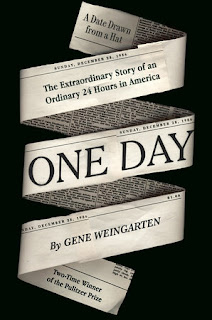One Day by Gene Weingarten **** (of 4)
On a challenge, Gene Weingarten wrote a book about December 28, 1986, a Sunday in America picked at random. Think of all the newspapers in the country and what might have made the cut back in the day and it is pretty much what you'd expect: fires, murders, sports, car crashes, arrests, celebrations, and the arts, though not a lot of arts as the selected date fell in the quiet week between Christmas and the New Year.
In the hands of twice-awarded Pulitzer Prize author, story after story unfolds to reveal the full depth of the American experience. A burning house, when fully investigated, includes the life-altering reactions of fire-fighters, children caught in the blaze, and parents whose trajectories from birth to that cataclysmic moment are far more complex than they are described in a newspaper column. Those swoops and arcs, measured as snapshots on December 28, are carried through the next 25 years with contemporary interviews.
A football playoff game, similarly covered in the sports pages by a final score and highlights, beneath Weingarten's skillful analysis, turns out to be the day on which in-game Instant Replay came into its own.
Race, the American illness of categorizing lives based upon skin color, pervades and overrides a depressingly large number of events and reminds us how little progress we have made in two and a half decades.
Every tale begins with what is essentially the news account and a time stamp, and then Weingarten excavates. Surprises emerge, reversals on the surprises occur, and unexpected endings undo everything we surmised at the beginning. Marvel at Weingarten's capacity to unfold a story well told can give way to a kind of exhaustion as the wait for a reveal ensues. But when the day is done, and a moment after midnight begins December 29, there is nothing but awe at the revelation that every day, no matter how mundane, is exceptional in its own way.
In the hands of twice-awarded Pulitzer Prize author, story after story unfolds to reveal the full depth of the American experience. A burning house, when fully investigated, includes the life-altering reactions of fire-fighters, children caught in the blaze, and parents whose trajectories from birth to that cataclysmic moment are far more complex than they are described in a newspaper column. Those swoops and arcs, measured as snapshots on December 28, are carried through the next 25 years with contemporary interviews.
A football playoff game, similarly covered in the sports pages by a final score and highlights, beneath Weingarten's skillful analysis, turns out to be the day on which in-game Instant Replay came into its own.
Race, the American illness of categorizing lives based upon skin color, pervades and overrides a depressingly large number of events and reminds us how little progress we have made in two and a half decades.
Every tale begins with what is essentially the news account and a time stamp, and then Weingarten excavates. Surprises emerge, reversals on the surprises occur, and unexpected endings undo everything we surmised at the beginning. Marvel at Weingarten's capacity to unfold a story well told can give way to a kind of exhaustion as the wait for a reveal ensues. But when the day is done, and a moment after midnight begins December 29, there is nothing but awe at the revelation that every day, no matter how mundane, is exceptional in its own way.

Comments
Post a Comment